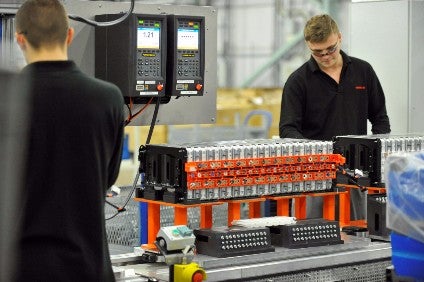
Honda is carrying out research with Ohio-based, American Electric Power (AEP) to develop a network of used EV batteries, which could be integrated into AEP’s electricity system.
The project seeks to address multiple challenges related to the expansion of EVs, including the repurposing of used batteries, the expected impact of demand and renewable energy on the nation’s utility operators and the integration of batteries as a storage solution for the electric grid.

Discover B2B Marketing That Performs
Combine business intelligence and editorial excellence to reach engaged professionals across 36 leading media platforms.
The increasing volume of EVs has the potential to strain the power grid, including spikes in demand during early evening hours when drivers plug in their EVs after work. Storing additional power in used EV batteries can help utilities meet demand by using renewable energy resources.
“Together with AEP, we are exploring opportunities to use the second life battery to improve energy security, reduce CO2 and prepare for broad-scale electrification of the transportation ecosystem,” said American Honda Motor Connected and Environmental Business manager, Ryan Harty.
“Neither automakers nor utilities can address these complex technical, policy and business issues alone.”
Honda will provide used Fit EV batteries to AEP, which will study integrating the batteries into the utility’s electricity grid.
AEP and Honda will jointly gain knowledge and expertise from the pilot project, which will help both companies to develop technology and standards for future vehicle grid integration, as well as new business models to improve the value of EVs.
Honda has set a voluntary goal to reduce CO2 emissions from its vehicles and operations by 50% by 2050 compared to 2000 and has announced plans to electrify two-thirds of its fleet by 2030.
In addition to producing zero-emission vehicles, the company is developing vehicle grid integration solutions, including the beta Honda SmartCharge programme, which incentivises Honda EV customers to charge their vehicles when more renewable energy resources are online.
At CES 2019, Honda introduced its prototype Wireless Vehicle-to-Grid (V2G) bi-directional energy management system, which has the potential to reduce CO2.






